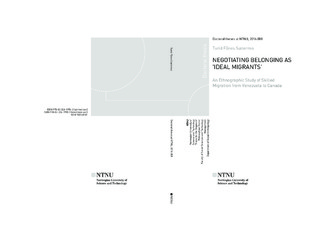| dc.description.abstract | This dissertation explores skilled migrants' negotiations of belonging, home and identity at the
interface between personal life projects and the structural conditions of migration. Its overall aim
is to extend our understanding of how migrants' subjective interpretations and strategies shape
various kinds of attachments. In so doing, the work also seeks to illuminate the complexity of
drivers behind migration trajectories.
The empirical case of the dissertation is Venezuelan skilled migrants in Montreal, Canada. Their
migration unfolds in a context of Canadian immigration policies aiming to attract ‘ideal
immigrants’ with regards to labor market needs and demographic concerns. The dissertation's
focus on migrants' subjective experiences therefore intersects with a focus on policies
representing opportunity, prescription and expectations with regards to migration trajectories.
More specifically, the study examines the skilled worker program, in which migrants are selected
on the basis of skills, work experience, age, health and presumed adaptability; factors that are
expected to yield successful, immediate and self-reliant integration. The skilled worker program,
then, could be described as designed to single out the ‘grains of gold’ from the ‘grains of sand’.
The dissertation empirically and theoretically explores questions such as: What are the
aspirations and claims of home, belonging and identity that underpin migration trajectories and
strategies? How are destinations imagined, and life after migration anticipated and planned for?
How is belonging negotiated and given meaning in the new context? How are experiences and
strategies influenced by broader expectations of successful economic and social integration?
The ethnography that forms the basis of the study is the product of an in-depth, qualitative
research involving fieldwork, interviews and open-ended conversations. The study's narrative
approach implies that the notions of identity, home and belonging will be analyzed by looking at
how they are constructed, redefined and represented in migrants' narratives. | nb_NO |
